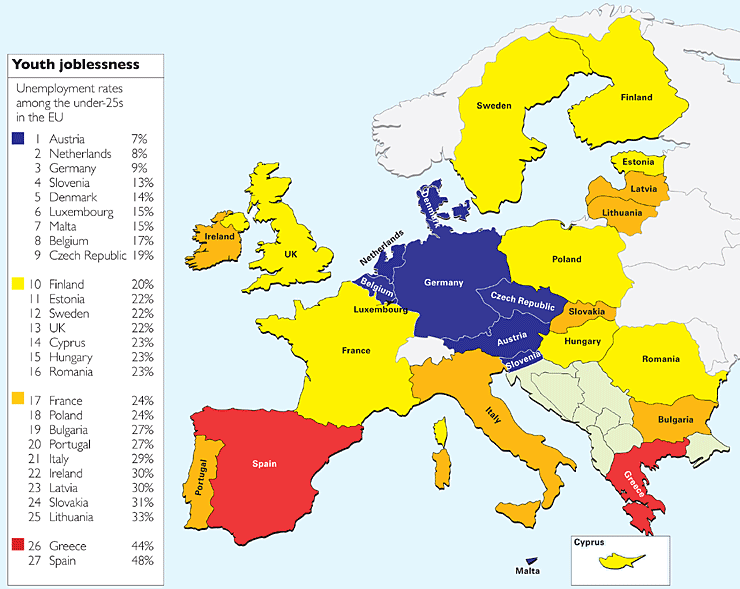Get the latest financial news, insights and expert analysis from our award-winning MoneyWeek team, to help you understand what really matters when it comes to your finances.
You are now subscribed
Your newsletter sign-up was successful
Want to add more newsletters?

Twice daily
MoneyWeek
Get the latest financial news, insights and expert analysis from our award-winning MoneyWeek team, to help you understand what really matters when it comes to your finances.

Four times a week
Look After My Bills
Sign up to our free money-saving newsletter, filled with the latest news and expert advice to help you find the best tips and deals for managing your bills. Start saving today!

Youth unemployment is a "huge" problem, says Iain Martin in The Daily Telegraph. For the first time since 1986, British youth unemployment has topped one million. More than one in five 16-24 year olds is jobless (see the map above, which shows how Britain compares to the rest of Europe). Sure, around a quarter are students looking for part-time work. But 750,000 without jobs "is still an enormous waste of human potential".
While "concerned ministers have set about schemes that try to alleviate the crisis, critics call [these] small beer". So government hopes are pinned on the Chancellor encouraging hiring in his autumn statement. "But early indications are that he'll not go much beyond generalities and pro-business rhetoric." "Youth unemployment is unlike unemployment of any other sort," says The Times. "Someone who has entered the labour market unwanted may have no skills at all. By the time the economy recovers, they may be less employable." And "those who suffer unemployment early in their working lives are more likely to be unemployed again later".
Children's charity Barnardo's calculates that teenagers not in a job, education or training by the age of 18 will, on average, cost the state £56,000 more over their lifetimes than those who are. "A spike in joblessness among the young is also a breakdown in the contract of how society is supposed to function".
MoneyWeek
Subscribe to MoneyWeek today and get your first six magazine issues absolutely FREE

Sign up to Money Morning
Don't miss the latest investment and personal finances news, market analysis, plus money-saving tips with our free twice-daily newsletter
Don't miss the latest investment and personal finances news, market analysis, plus money-saving tips with our free twice-daily newsletter
The government should create a tax-free "bond for hope", says the boss of the Royal Society for the Encouragement of Arts, Manufactures and Commerce, Matthew Taylor. "This would aim to make £2bn available immediately to fund roughly a quarter of a million jobs." The money would come partly from the government, with the rest funded by the country's top 100 firms and the public, such as "well-off pensioners".
But there may be a better way, suggests Sir Richard Branson in The Independent on Sunday. "Many young people have an entrepreneurial spirit and display exceptional drive," yet there's a major problem. "Young entrepreneurs [say] it's easier to get a loan to study enterprise" than start a business. So why not "offer start-up loans to young people on the same terms as student loans?" Meanwhile, let's shorten degrees (to, say, 18 months) to reduce debt and motivate students "for the jobs of the future".
Get the latest financial news, insights and expert analysis from our award-winning MoneyWeek team, to help you understand what really matters when it comes to your finances.
MoneyWeek is written by a team of experienced and award-winning journalists, plus expert columnists. As well as daily digital news and features, MoneyWeek also publishes a weekly magazine, covering investing and personal finance. From share tips, pensions, gold to practical investment tips - we provide a round-up to help you make money and keep it.
-
 Should you buy an active ETF?
Should you buy an active ETF?ETFs are often mischaracterised as passive products, but they can be a convenient way to add active management to your portfolio
-
 Power up your pension before 5 April – easy ways to save before the tax year end
Power up your pension before 5 April – easy ways to save before the tax year endWith the end of the tax year looming, pension savers currently have a window to review and maximise what’s going into their retirement funds – we look at how

